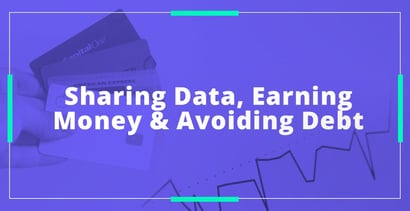

In a Nutshell: With many U.S. residents affected by COVID-19 and struggling with debt, there’s never been a better time to seek avenues to earn extra income. Taking on another job or starting your own side hustle may boost revenue, but those kinds of endeavors deplete another valuable resource that not everybody has — time. Passive income provides paths to extra cash without major investments of time or money. One way consumers can earn passive income is by sharing their online data with companies. We spoke with Dana Budzyn, Co-Founder and CEO of Universal Basic Data Income, to learn more about this tactic. Companies like UBDI empower consumers to take control of their data and get paid when companies use it in an anonymized, secure system.
Millions of people in the U.S. live paycheck to paycheck and struggle to stay a step ahead of their debts. These economic challenges have only grown more pressing over the past year as the COVID-19 pandemic has surged across the country.
Many who were already struggling with debt found themselves in even more challenging circumstances as they lost jobs and benefits. The internet is packed with articles suggesting ways to earn extra income and tackle debt via part-time employment options and other side hustles.

Consumers can leverage their digital data to earn money from businesses.
While many of these ideas may look nice on the digital screen, in reality, they fail to factor in another finite resource — time. Starting your own blog and learning how to monetize it is a viable way to earn income, but for working parents already working a full-time job who want to be engaged in their children’s lives, these kinds of endeavors aren’t realistic.
But creating revenue via passive income streams is a different story. Passive income is largely just what it sounds like — a way to earn money that doesn’t require a huge time commitment or overhead costs. People who have passive income coming in can go about their daily lives, pay down existing debt, and grow a fund to stash away for a rainy day.
If you’re wondering how to get in on this solution, look no further than your smartphone. Many companies view our smartphones as virtual treasure troves of data, which they can leverage into profits for their own purposes. As a culture, we have been groomed to click away our data rights without giving it much thought. But we can actually control our data and companies will pay us for it.
We recently spoke with Dana Budzyn, Co-Founder and CEO of Universal Basic Data Income, or UBDI, to learn more about managing data and how consumers can leverage their data to earn money.
Empowering People to Leverage Data to Their Advantage
Budzyn said she launched UBDI around the notion of putting the power of data back in people’s hands.
“The idea is to empower people with their data so that they can choose when and with whom they share their data — whether it’s a monetary exchange, a value exchange, or whatever seems fair to them,” she explained. “The goal is to give people collective leverage over the value they provide while increasing transparency across the data industry.”
Budzyn noted that, while a number of companies exist in the market that provide similar services to UBDI, she primarily addresses her company’s approach to this relatively new area.

Dana Budzyn is the Co-Founder and CEO of UBDI.
Basically, consumers can make money by sharing anonymous insights from their data that companies can use for market research. The data is aggregated and anonymized, so information is not tied to specific individuals.
“Your data is an asset. It’s a universal asset that every American, every person from every inch of the globe has,” she said. “And right now it’s being abused and monetized by big and small tech companies and their power is only growing.”
The goal with services such as UBDI is to give consumers some control over that data and gain some compensation for it because the companies that are using it are profiting, Budzyn said.
Companies like UBDI serve as a go-between to broker the data exchange between individuals and companies.
“Every time a company purchases a study, our users get paid in cash and UBDI points to track their contributions for special rewards and voting rights,” according to the company website.
How Companies Benefit from this Information
Of course, the flipside of individuals earning money by sharing their anonymized data is that companies can gain access to specific data points relevant to their goals.
“Extract the insights from data you need with reduced liability and risk,” according to the UBDI website. “With UBDI, we transform permissioned data across hundreds of linked sources into insights that drive action, growth, and revenue.”
There are various ways companies can approach these kinds of data services, Budzyn said, but UBDI helps companies define their desired parameters and watch the data roll in.
“You seamlessly build a study in three easy steps, you’ll reveal dynamic, new insights about your customers and prospects in days instead of months. The possibilities are endless: Make any combination you desire with data across hundreds of sources in less than five minutes. You don’t have to be a data scientist!” — Universal Basic Data Income
Companies can request access to a wide array of data, including YouTube subscriptions, Spotify listening histories, beauty product purchases, and brand mentions on Twitter. The possibilities are nearly endless.
“Now you can reach your perfect audience and respect their privacy,” according to UBDI. “Using decentralized micro-targeting with edge processing and machine learning, our audience builder instantly matches you with people you want to request data from or ask questions for rich insights.”
Budzyn said the ad industry is globally spending more than $600 billion — and growing — in marketing.
“There’s this ad industry that is looking for digital real estate in front of someone’s face,” she said. “And companies like UBDI use the data to match them with the type of customer they’re looking for.”
The idea is that if companies can specifically target users who are more likely to use their products or services, they can increase profits and bring on new customers.
Ensuring that Security Remains a Top Priority
With a number of large corporations becoming victims of highly visible data breaches in recent years, some consumers remain skeptical about sharing data with any companies if they can avoid it.
But Budzyn explained how UBDI works to keep data safe, secure, and anonymous.

When consumers sell data to companies, the information is aggregated and anonymized to ensure security is maintained.
“Unlike other apps, you won’t find our privacy terms confusing and long because you and only YOU are in full control of your data,” according to the company. “UBDI leaves the keys with you and ONLY you on your device so no researcher and not even UBDI can unlock your secured and encrypted data vault until you give us the okay.”
Budzyn explained that in some cases, data is out of users’ hands and also out of the hands of companies like UBDI. Facebook is a prime example, where users agree to certain data and privacy terms when they sign up to use the service.
But companies that are helping consumers leverage data operate in a much more transparent fashion.
“UBDI provides checks and balances so you are always in control,” according to the company. “We are constantly working with privacy advocates and experts across the globe to make this even more transparent and understandable for informed consent without people reading a boring ToS!”
Ultimately, Budzyn said she doesn’t think the data-leveraging space will be dominated by a single business but will be advanced by multiple companies providing similar services.
“I don’t think there’s going to be one company that makes this all happen and tackles all sides of the equation,” she said. “There is going to be multiple players and consumers will probably have to be part of several companies to get income on different fronts.”
But she said she believes there will be a day where consumers will be fairly compensated for their data in a secure and convenient way.
Advertiser Disclosure
BadCredit.org is a free online resource that offers valuable content and comparison services to users. To keep this resource 100% free for users, we receive advertising compensation from the financial products listed on this page. Along with key review factors, this compensation may impact how and where products appear on the page (including, for example, the order in which they appear). BadCredit.org does not include listings for all financial products.
Our Editorial Review Policy
Our site is committed to publishing independent, accurate content guided by strict editorial guidelines. Before articles and reviews are published on our site, they undergo a thorough review process performed by a team of independent editors and subject-matter experts to ensure the content’s accuracy, timeliness, and impartiality. Our editorial team is separate and independent of our site’s advertisers, and the opinions they express on our site are their own. To read more about our team members and their editorial backgrounds, please visit our site’s About page.




